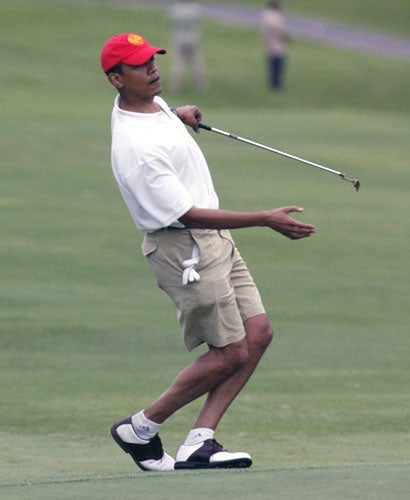Obama maintains silence in first major test

Your support helps us to tell the story
From reproductive rights to climate change to Big Tech, The Independent is on the ground when the story is developing. Whether it's investigating the financials of Elon Musk's pro-Trump PAC or producing our latest documentary, 'The A Word', which shines a light on the American women fighting for reproductive rights, we know how important it is to parse out the facts from the messaging.
At such a critical moment in US history, we need reporters on the ground. Your donation allows us to keep sending journalists to speak to both sides of the story.
The Independent is trusted by Americans across the entire political spectrum. And unlike many other quality news outlets, we choose not to lock Americans out of our reporting and analysis with paywalls. We believe quality journalism should be available to everyone, paid for by those who can afford it.
Your support makes all the difference.During the autumn presidential election campaign, Barack Obama's running mate, Joe Biden, was much mocked for suggesting that a President Obama would be tested by a major foreign crisis within a few months of coming to power.
In fact, that major crisis has erupted even before he takes office, in the shape of Israel's massive assault on Gaza – and the man who, in 20 days' time, will become the most powerful man in the world has said nothing. Mr Obama's silence is in keeping with his insistence that the US "has only one president at a time". But it is also a measure of just how intractable is the Middle East crisis that will face the incoming administration, and – many in the region believe – a sign his policies there will be less different from those of the departing Bush team than once expected.
Immediately after his victory on4 November, expectations were high in Arab capitals that America's first black president would shift US policy way from the Bush administration's pro-Israeli stance. But Mr Obama's appointment as his chief of staff of Rahm Emanuel, a fierce partisan of Israel, quickly dampened those hopes. So did his choice of Hillary Clinton as Secretary of State-designate.
Back in 1998 when she was first lady, she attracted Israeli ire for appearing to support a separate and independent Palestinian state, long before the idea became official US policy. But in Senator Clinton and then candidate Clinton in 2008, Israel could not have wished for a more reliable friend. Like Mr Obama, she has remained silent this week.
The offensive against Hamas may yet scramble every equation. Among Palestinians, the fighting is likely to strengthen the extremists. In the wider Arab world, it may increase resentment against pro-American regimes like those of Egypt and Saudi Arabia who have done nothing to try to stop the fighting.
Some in Washington are already pressing Mr Obama to launch a new peace initiative to replace the moribund Annapolis process.
But two huge obstacles stand in his way. He must wait for at least six weeks until Israel's general election, which may produce another weak and fractured government. In the meantime there is little sign of Hamas and the Fatah movement led by Palestinian President Mahmoud Abbas settling their differences.
Join our commenting forum
Join thought-provoking conversations, follow other Independent readers and see their replies
Comments